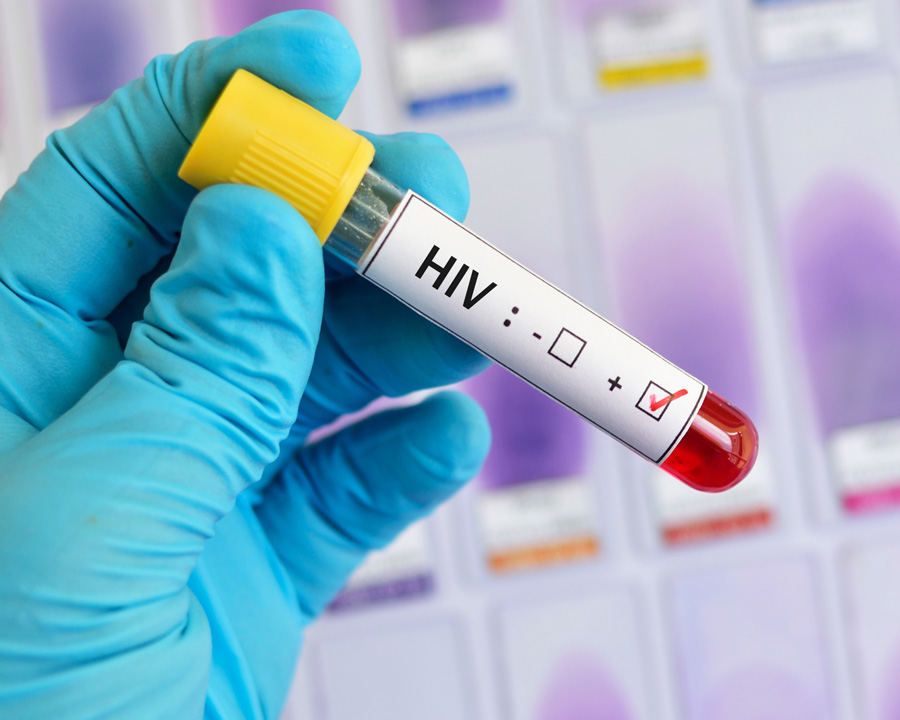
HIV 101
Learn more about HIV, how it is transmitted, how to prevent it, and the resources that are available to help.
Know Your Status

About HIV
AIDS is a chronic, life-threatening condition caused by the human immunodeficiency virus (HIV). The virus and initial infection are known as HIV, while the term acquired immunodeficiency syndrome (AIDS) is used to mean the later stages of an HIV infection.
By damaging or destroying the cells of your immune system, HIV interferes with your body’s ability to effectively fight off viruses, bacteria, and fungi that cause disease. This makes you more susceptible to certain types of cancers and to infections your body would normally resist, such as pneumonia and meningitis.
Transmission
HIV is spread through some of the body’s fluids, including blood, semen, vaginal fluids, breast milk, and some bodily fluid sometimes handled by healthcare workers (fluids surrounding the brain and spinal cord, bone joints, and around an unborn baby). There is a lot of misinformation out there regarding HIV transmission, so it’s important to fully understand the facts about how it is transmitted.
HIV can be transmitted from one person to another by:
- Having unprotected sex (vaginal, anal, or oral) with a person who has HIV
- Sharing needles with someone who has HIV
- During pregnancy, birth, or breast-feeding if a mother has HIV
- Getting transfusions of blood with HIV, which is rare in the United States
You cannot get HIV/AIDS from:
- Casual contact such as shaking hands or hugging a person with HIV/AIDS
- Using a public telephone, drinking fountain, restroom, swimming pool, Jacuzzi, or hot tub
- Sharing a drink
- Being coughed or sneezed on by a person with HIV/AIDS
- Giving blood
- Mosquito bites or any other kind of animal bite
Prevention and Education
Know the Risk Factors
There are many preventative steps you can take against HIV/AIDS, including knowing the risk factors for contracting HIV.
If you answer yes to any of these questions, we advise that you seek counseling and testing. You may be at increased risk of infection if any of the following apply to you since 1978:
- Have you injected drugs or steroids or shared equipment (such as needles, syringes, cotton, water) with others?
- Have you had unprotected vaginal, anal, or oral sex?
- Have you exchanged sex for drugs or money?
- Have you been diagnosed with or treated for hepatitis, tuberculosis (TB), or a sexually transmitted disease (STD), like syphilis?
- Have you received a blood transfusion or clotting factor between 1978 and 1985?
- Have you had unprotected sex with someone who could answer yes to any of the above questions?
Other Considerations
- If you have had sex with someone whose history of risk-taking behavior is unknown to you or if you/ they have had many sex partners, then you have increased the chances that you might be HIV infected.
- If you plan to become pregnant, counseling and testing is even more important. If a woman is infected with HIV, medical therapies are available to lower the chance of passing HIV to the infant before, during, or after birth
Resources
For more information on HIV/AIDS and other Sexually Transmitted Diseases, please visit these websites:
- Virginia Department of Health
- Centers for Disease Control and Prevention
- AIDS.GOV (Access to U.S. Government information HIV/AIDS information)
- KNOW HIV/AIDS
- National HIV Testing Resources (A Service of the Centers for Disease Control and Prevention)
- AIDSinfo: (Offering information on HIV/AIDS Treatment, Prevention, and Research)
- The Henry J. Kaiser Family Foundation
- UNAIDS
- QuitDay
- Quit Smoking Community

